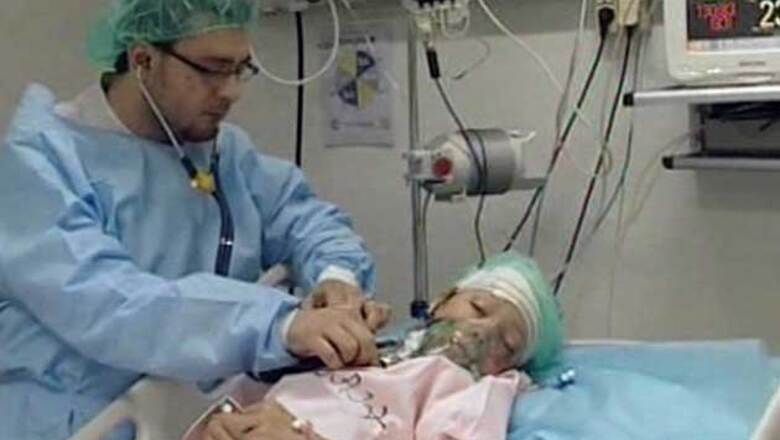
views
Tripoli: The Dutch boy who survived a plane crash that killed 103 people in the Libyan capital is doing well after surgery on his shattered legs, doctors on said Thursday as details of the child's identity emerged.
A local newspaper in the southern Netherlands said the lone survivor of the crash appeared to be 9-year-old Ruben van Assouw from the city of Tilburg.
His grandmother, An van de Sande, told the paper Ruben was in South Africa on safari with his brother and parents, who were celebrating their wedding anniversary, according to the Brabants Dagblad daily. She told the paper that she had not personally seen the television footage of the survivor, but other family members who had were not certain that the boy was their relative.'
The Dutch Foreign Ministry confirmed the boy had told an embassy official who spoke to him on Thursday morning that his name is Reuben, he is 9 years old and he comes from Tilburg. The ministry did not publish a last name but said the boy's uncle and aunt had arrived in Tripoli and would see him as soon as possible.
"As soon as his health permits he will be brought to the Netherlands," the Foreign Ministry statement said.
The boy had been widely shown in Libyan TV footage laying on a hospital bed after Wednesday's crash but he was breathing through an oxygen mask but his features were largely hidden from view.
He underwent surgery for multiple fractures in both legs after being pulled from the debris of the Afriqiyah Airways Airbus A330-200 that crashed minutes before landing in Tripoli after a more than seven-hour flight across the African continent from Johannesburg.
About half of the crash victims were Dutch tourists who had been vacationing in South Africa.
Dr Hameeda al-Saheli, the head of the pediatric unit at the Libyan hospital where he was treated, told the official Libyan news agency on Thursday that the boy is breathing normally and his vital organs are intact.
Al-Saheli said the boy suffered four fractures in his legs and lost a lot of blood, but she said his neck, skull and brain were not affected by the crash and he did not suffer internal bleeding.
Officials had no immediate explanation for the boy's survival. There have been at least five cases this decade of a single survivor in a commercial plane crash. Last summer, a young girl was found clinging to wreckage 13 hours after a plane went down in the water off the Comoros Islands.
"The idea of a lone survivor might seem a fluke, but it has happened several times," said Patrick Smith, an American airline pilot and aviation author.
In a field near the Tripoli airport runway, little was left of the Afriqiyah Airbus.
Libya's transport minister, Mohammed Zaidan, said the plane's two black boxes had been found and turned over to analysts. He said the cause of the crash was under investigation, but authorities had ruled out a terrorist attack.
Afriqiyah Airways said Flight 771 was carrying 93 passengers and 11 crew.
It said the passengers included 58 Dutch, six South Africans, two Libyans, two Austrians, one German, one Zimbabwean, one French and two British. The nationality of 19 more passengers have yet to be established, it said in a later statement. All 11 crew members were Libyan, it added.
Many of the passengers were booked to travel from Tripoli on to other destinations in Europe.
More than 600 A330s have been built since the type entered service in 1994. The Afriqiyah crash is only the second fatal accident involving an A330 in airline service. The other was the crash of Air France flight 447 a year ago off the coast of Brazil.
But last month, an A330 belonging to Cathay Pacific was forced to make an emergency landing in Hong Kong because of engine trouble. Fifty-seven passengers suffered mostly slight injuries in the ensuing evacuation.
The Hong Kong Civil Aviation Department said control problems with the two Rolls-Royce engines forced the Airbus to land at a higher-than-normal speed, damaging an engine cowling, puncturing the tires and causing a small fire in the wheelwell.
The pilots reported that they were unable to get the engines to function normally, and that during the approach and landing phase one was operating at 17 per cent of thrust while the other was stuck at 70 per cent.













Comments
0 comment